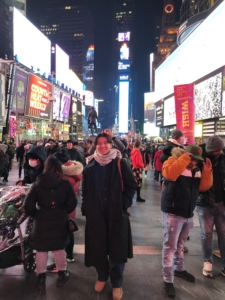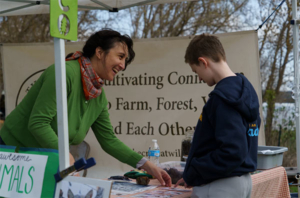SOU’s expanded Career Connections office opens new space and opportunities
(Ashland, Ore.) – Southern Oregon University’s Career Connections office has opened its doors in a new space – Stevenson Union 310 – in a move that will increase visibility and allow more students to be served.
The office, upstairs next to the Social Justice and Equity Center (SJEC), is ready for an increase in students for individual and small group sessions around career planning, leadership development and career-connected learning opportunities. SOU faculty and staff are invited to an open house to see the new space on Wednesday, Oct. 11, from 3 to 5 p.m. Students and alumni are encouraged to attend an upcoming Job and Internship Fair from 11 a.m. to 2 p.m. on Thursday, Oct. 26, in the Stevenson Union’s Rogue River Room.
Career Connections has expanded its team to include two full-time professional staff and a graduate assistant. Stacey Westrum, SOU’s new director of Career Connections, brings a decade of experience with the university in student advising, adult education and corporate relations. She will be strengthening SOU’s bonds with employers across southern Oregon as part of the institution’s mission to promote economic vitality as a regionally-engaged institution.
Westrum will be the staff advisor for the National Society of Leadership Success, which is entering its second year at SOU as a vehicle for student leadership development and peer networking. She will be working closely with this year’s inaugural cohort of LAD scholars – participants in the $5 million Lithia & GreenCars Scholarship Program, a component of SOU’s landmark, $12 million philanthropic gift last year from Lithia (NYSE: LAD).
The LAD Scholars program, which has attracted an exceptional group of incoming students, combines financial aid awards with leadership development opportunities, focusing on first-generation and/or minoritized populations that are traditionally underrepresented in higher education.
“I am excited to be in this new role at SOU to build the Career Connections office to deepen relationships with employers, collaborate across campus and help our students with their career paths and leadership skills,” Westrum said.
The new coordinator of Career Connections, Ariel Bloomer, will be focused on student advising for career exploration and job search preparation, meeting needs expressed by SOU student responses in the National Survey of Student Engagement (NSSE).
“I am thrilled to continue working with SOU students in a role so closely tied to the university’s vision of guiding all learners to create lives of purpose,” she said.
As part of a strengths-based advising approach, Bloomer will become certified in CliftonStrengths, and will help groups of students analyze and articulate the unique traits they bring to the table.
Career Connections offers students a range of services, including resume and cover letter reviews, introductions to networking, job search assistance for on- and off-campus jobs, and interview preparation. Students can also come in to talk through changes in their academic and career goals as plans and dreams shift throughout their university experience.
The Career Connections website hosts a number of tools for researching occupational outlooks, exploring interests and skills through self-assessments, and creating application materials. Students can make individual advising appointments through Handshake, Navigate, or by emailing careerconnections@sou.edu. By engaging in a strategic series of classroom visits throughout the year, Career Connections will help students learn about these services and start pursuing intentional professional development earlier in their college careers.
The 2023-24 academic year marks the 10-year anniversary of the PEAK Program, coordinated out of Career Connections. PEAK – which stands for professional experience, achievement and knowledge – funds student jobs across campus designed to meet significant student learning outcomes and facilitate work-based learning and career growth for participating students. This year sees a re-envisioning of the program to provide additional development opportunities for PEAK students.
By partnering with programs, offices and academic departments across campus, Career Connections aims to promote equitable student outcomes. As a First-gen Forward university, SOU is committed to ensuring that students receive a tightly woven web of support to achieve the return on investment in their education that they are seeking.
“We are excited to share the wealth of resources housed in Career Connections with students, faculty and alumni,” said Dean of Students Carrie Vath, Ph.D. – affectionately known by students as “Dr. V.”
To learn more about Career Connections’ offerings, please visit the website at careers.sou.edu and follow its Instagram account @SOUcareerconnections.
-SOU-




 The most striking cultural clash for Aiki has been experiencing American individualistic culture, as the foreign frame of mind comes off as abrasive. The self-importance that seems ingrained in American culture has been a confounding adjustment for Aiki. Social behaviors in the U.S. that have stood out to him are that people are friendly here, yet they distance themselves from others and make it clear that other people are “not their problem,” he says, and people are not nearly as consumed with their own agendas back home.
The most striking cultural clash for Aiki has been experiencing American individualistic culture, as the foreign frame of mind comes off as abrasive. The self-importance that seems ingrained in American culture has been a confounding adjustment for Aiki. Social behaviors in the U.S. that have stood out to him are that people are friendly here, yet they distance themselves from others and make it clear that other people are “not their problem,” he says, and people are not nearly as consumed with their own agendas back home.
 This year’s Earth Day celebration was sponsored by
This year’s Earth Day celebration was sponsored by 




